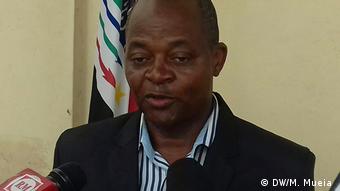Mozambique: Credit to economy falls 2% in June
Is it Erik Prince and the ‘bain marie’? – Mozambique

FILE: Erik Prince, one of Tunamar's owners through Frontier Services Group. [File photo: UPI]
Mozambican authorities may be intentionally delaying the start-up of Tunamar’s activities, owned by Ematum and Erik Prince’s Frontier Services. Supposedly undeclared business interest may be the reason.
The Mozambican government is believed to be delaying the start-up of Tunamar, 51% owned by Ematum and 49% owned by Erik Prince’s Frontier Services Group.
The reasons for delaying the company’s operations are not officially known, but it is known that the Mozambican government has demanded procedures considered unusual in the fishing sector.
Analyst Calton Cadeado believes that procedural issues are at the root, but “there are other elements that in fact always raise suspicions – one of them is the security component, which is not yet clear, especially since the Mozambican government does not yet have the installed capacity to oversee operations that may be delegated to Tunamar”.
The process has been dragging on since the partnership between the two parties began in late 2017. The authorities are now talking about a public tender for the use of part of the port of Maputo, the country’s most important port, after the Frontier Services Group submitted a project for the concession.
Erik Prince, owner of Frontier, is a “big fish” in maritime safety and oil exploration contexts. He has worked for the U.S. government on projects of even greater magnitude.
The price to pay for the “bain marie” or retreat
It is believed that it is in Mozambique’s true interest to lead safety, especially in the Rovuma Basin, where US oil companies operate. What could a “bain marie” or government retreat cost the country?
“In principle we are going to have that normal pressure, which we have become accustomed to seeing because of the fragile situation in which the government finds itself with the hidden debts process,” Cadeado says.
But he warns that “the Ematum issue still remains to be solved. The companies have to be made viable, or the pressure will continue to exist. I just do not know if it will be through government, through the companies or both”.
Yet another strategy may be activated, Cadeado posits.
“The other thing at the moment is that Mr. Erik Prince, since he has no visible partner, Mr. Carlos do Rosario [being currently detained], he can eventually reduce the pressure or step it up commercially and not so much in the security dimension, because it was with security that he was working.”
ALSO READ: Watch: U.S. businessman may invest in Ematum – AIM report

Other cards on the table
But the “bain marie” may be associated with other “problematic” issues involving the US, such as the extradition of former Mozambican finance minister Manuel Chang, seen as opposing the U.S. or the North American oil companies and Mozambique.
“Private security companies are very keen to win contracts to protect the business in the Rovuma basin,” the analyst says. “These are billion-dollar deals; people are already talking about 50 billion dollars. So Erik Prince, coming here via the fishing issue, was a kick-off also to get into the security area.”
Cadeado supposes that they are “moves” at the heart of everything.
“The Mozambican government may be making certain concessions right now, even around the case of debts, extradition … [this] without much data yet – I am putting this forward as a hypothesis. So the pressure from Erik Prince will not be as close to what is already happening right now.”
ALSO READ: Mozambique says agrees restructuring deal with bondholders, no longer sharing gas revenues

Secrecy contested
The dossiers on the agreements are not in the public domain, although they involve issues of public interest, such as the preservation of sovereignty. Not even security safeguards, normally used as an excuse for secrecy, minimise mistrust on the subject.
Mozambique’s largest opposition party, the Mozambican National Resistance (Renamo), with seats in parliament, is “out of the loop” on the subject.
“We do not have much knowledge about this matter. As you know, business is often done behind closed doors, so we do not have any substantive knowledge about this matter. It is difficult for Renamo to make any comments or take a position about it,” Renamo spokesperson José Manteigas says.
“There is business that is unknown even to parliament, and we have often discovered that it harms the Mozambican state. Indeed, we have the unconstitutional and illegal debt case… .”












Leave a Reply
Be the First to Comment!
You must be logged in to post a comment.
You must be logged in to post a comment.